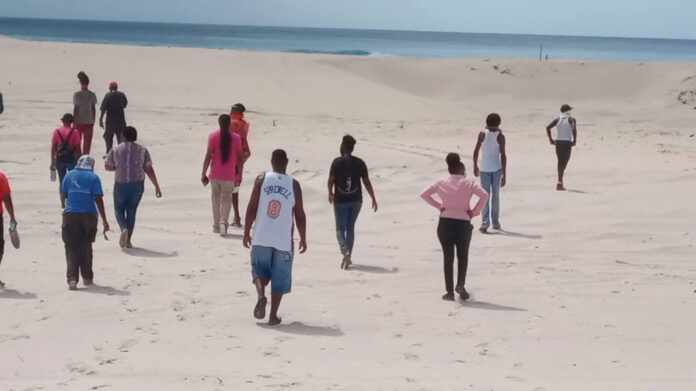
By Gemma Handy
The case against 22 Barbudans accused of trespassing on the site of the controversial Peace, Love and Happiness (PLH) development was yesterday thrown out by the sister isle’s Magistrate’s Court.
Defendants turned up to court ready for the trial which was scheduled to start on Thursday – only to learn that the prosecution had failed to bring a single witness.
The case’s dismissal is something of a coup for Barbudans who have bitterly protested the luxury homes and resort development on account of its environmental impact since work got underway in 2018.
The defendants were arrested in September 2020 after allegedly entering the site which was traditionally publicly accessible. They were among scores of local people, including Barbuda Council members and employers, said to have accessed the development via the beach.
Their lawyer Leon Symister previously said that while some of those affiliated with the council were trying to inspect the work underway, others including general villagers had merely been trying to visit the beach as is their right.
Yesterday he told Observer he was pleased the case was now over. Thursday’s hearing was the latest in a series of court appearances for the almost two dozen defendants since the proceedings began more than two years ago.
“The matter was brought, I indicated I was ready for trial, the prosecutor indicated she had no witnesses, so the court dismissed the matter for lack of prosecution.
“That’s the end of it. After two years and 11 days, the prosecution had no witnesses,” Symister said.
“We are happy that it’s over for the 22 defendants who have had to go to court repeatedly over a two-year period, despite insisting from the beginning that they were not guilty of doing anything.”
Two police officers on the scene when the incident unfurled had previously given evidence but witnesses had routinely failed to show up for previous hearings, Symister said, adding that he had “never seen any complaint from PLH” itself.
“This is why we believe it was politically motivated,” he continued. “It’s important to note that we never had a virtual complainant – a person who actually makes the complaint.
“And we never had any statement from the police indicating someone from PLH had made a complaint for trespassing, so even if the court did not dismiss the case, it would have been dismissed anyway.”
Among the council members implicated in the incident were Devon Warner and the body’s then secretary Paul Nedd who were arrested on charges including obstructing traffic and not wearing a facemask in a public place, contrary to Covid rules in place at the time.
Those charges were also thrown out.
“I am happy that the case has been dismissed and that life for all defendants can go back to normal,” Warner told Observer yesterday.
“Now we can move on and look to the next chapter.”
The US$2 billion PLH project has been unpopular among some from the outset, with many Barbudans claiming it is destroying the once pristine environment at Palmetto Point.
Investors behind PLH include John Paul DeJoria, the billionaire co-founder of Paul Mitchell hair products and a self-proclaimed environmentalist.
The development infringes on wetlands deemed to be of international importance under the RAMSAR Convention. Opponents also say it places endemic and critically endangered wildlife at risk, as well as encroaching on one of the world’s largest nesting sites for the magnificent frigatebird, the national bird.
Protesting Barbudans have been supported by a number of international advocates, including the non-profit Global Legal Action Network (GLAN) and Dublin-based human rights organisation Front Line Defenders.
A joint statement from the two bodies, released on Monday, said Barbudans opposing private development on the island had experienced “harassment, intimidation, defamation, and criminalisation”.
Long-running contention over land in Barbuda lies at the heart of the issue. Barbudans had practiced communal ownership of land on the island for centuries. But in June, London’s Privy Council – the country’s final appellate court – ruled in favour of central government which had claimed Barbudans were merely tenants on the land.
Not all Barbudans are opposed to private development on the sister isle. Some say they welcome the injection of fresh economic opportunities.
PLH’s Project President Justin Wilshaw told Observer the development currently employed more than 240 local people and supported 21 local businesses.
